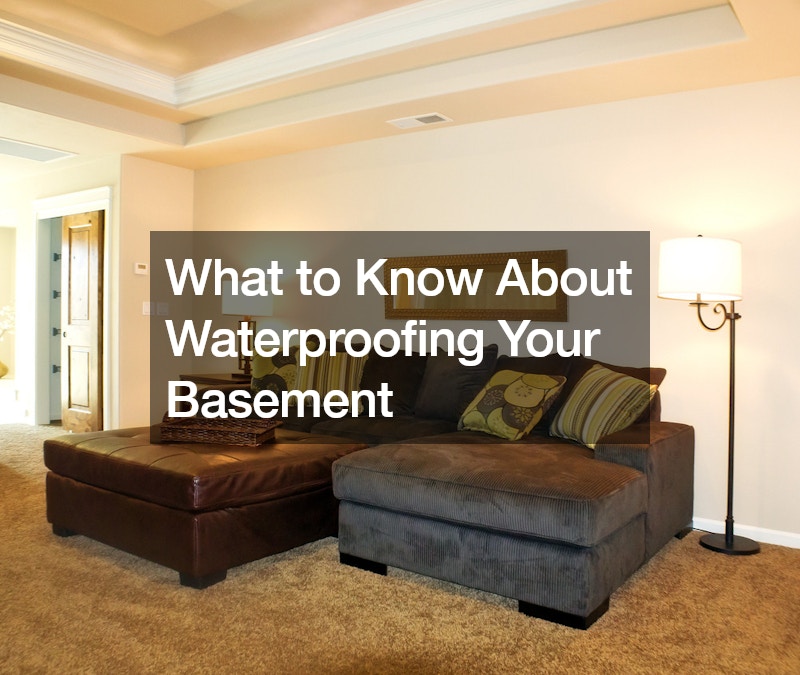Waterproofing your basement is an essential step in maintaining the structural integrity and value of your home. Unlike damproofing, which offers a minimal protection by inhibiting moisture from passing through a building’s foundation, waterproofing provides a full solution that blocks water from entering the space entirely. This article delves into the importance of choosing the right waterproofing system for your basement, the consequences of improper installation, and the key considerations homeowners should keep in mind.
Understanding the Difference Between Damproofing and Waterproofing
It’s crucial to distinguish between damproofing and waterproofing, as they serve different purposes. Damproofing typically involves a thin coating, usually tar-based, applied to the exterior of the foundation walls. This method is designed to keep out soil moisture but is insufficient for water resistance under hydrostatic pressure. Waterproofing, on the other hand, involves a more robust system that ensures water does not enter the basement environment at all. This includes the use of sealants, drainage systems, and barriers that manage water away from the foundation.
The Importance of Proper Waterproofing
The right waterproofing system prevents a myriad of problems that can be costly and detrimental to the health of your home. When water penetrates the basement, it leads to issues such as mold growth, wood rot, and deterioration of building materials. The lime, which acts as a glue holding together the components of concrete, can leach out in a process known as efflorescence. This not only weakens the structure but also leads to crumbling and cracking of the foundation walls. Thus, choosing an effective waterproofing system is not merely about keeping a basement dry; it’s about protecting the foundation of your home from serious damage.
Choosing the Right Waterproofing System
Not all basements and foundations are the same, and as such, the waterproofing system must be tailored to specific needs. The choice of system depends on several factors including the type of soil surrounding the home, the existing water table, and the overall climate. For example, homes in areas with high rainfall or those built on flood plains may require more robust waterproofing solutions than those in drier climates.
There are different methods of waterproofing, each with its pros and cons. Membrane applications, commonly made from rubber or plastic, are effective but can be costly. Interior sealants, while less expensive, may not address the issue of water pressure exerting force against the foundation. Therefore, a comprehensive approach often involves both internal and external waterproofing to manage water effectively.
Installation and Professional Assessment
Incorrect installation of a waterproofing system can lead to more harm than good. For instance, a poorly installed gutter system may only capture water once it has reached a detrimental level, failing to prevent hydrostatic pressure build-up. A superior system, such as one that includes a French drain installed deep around the foundation, can help manage water buildup more effectively by redirecting water away from the foundation and lowering the water table around the house.
Professional assessment by a qualified waterproofing expert is crucial. These professionals can evaluate the unique aspects of your home and recommend the best solution. They can also ensure that the installation adheres to building codes and addresses both immediate water issues and long-term preservation of the foundation’s structural integrity.
Maintenance and Long-term Care
Waterproofing your basement is not a set-it-and-forget-it solution. Regular maintenance is essential to ensure the system continues to function correctly. This includes checking the sump pump, cleaning gutters and downspouts, and inspecting the exterior drainage to ensure it is free from blockages. Homeowners should also be vigilant about new cracks or signs of moisture, as these could indicate potential failures in the waterproofing system.
Conclusion
Effective basement waterproofing goes beyond simple damproofing. It requires a thorough understanding of both the problem at hand and the solutions available. By choosing the right waterproofing method and ensuring proper installation and maintenance, homeowners can protect their properties from water damage, enhance their homes’ comfort and safety, and maintain their investment for years to come. Always consult with professional waterproofing services to get a tailored solution that meets the specific needs of your home’s foundation and geographic conditions. When was the last time you paid attention to the foundation of your home? Is it time to consider hiring waterproofing and damproofing services? The sanctity of your home is at stake. Do your research and hire a qualified professional. Waterproofing your basement is essential for the well-being of your home. This can prevent further damage to you, your family, and your home. Consider these waterproofing techniques to achieve peace of mind.
.




